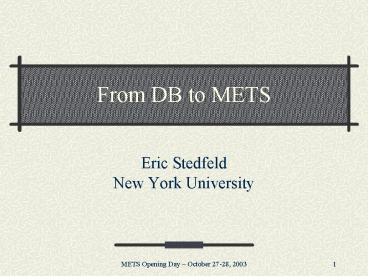From DB to METS - PowerPoint PPT Presentation
Title:
From DB to METS
Description:
METS Opening Day October 27-28, 2003. 1. From DB to METS. Eric Stedfeld. New York University ... Simple database structure for the most common METS needs ... – PowerPoint PPT presentation
Number of Views:87
Avg rating:3.0/5.0
Title: From DB to METS
1
From DB to METS
- Eric StedfeldNew York University
2
Goals
- Simple database structure for the most common
METS needs - Simple interface to take user input, generate
METS and return results - XML processing to convert and display selected
material in a web environment - Future extensions for more complicated media
types and metadata
3
Tools
- MySQL database to store structural, descriptive
and image technical metadata - Perl to take user input, query database, build
METS file and return Web success page - XT to transform METS XML to HTML using XSLT
- Tomcat to call XT servlet and display HTML to user
4
Web Interface Generate METS
5
Web Interface Success
6
Web Interface Return Results
7
Web Interface Select Page
8
Web Interface View Closeup
9
Database Schema ZeroDB
10
Database Schema Center
11
Database Schema Center
12
Database Schema Object Tree
13
Database Schema Subject
14
Database Schema Name
15
Database Schema Phys. Object
16
Database Schema Media
17
App Code Main Routine
use DBI... Set query, path and database varia
bles print_head Start "Success" HTML page d
bh DBI-connect("DBImysqldatabase",
dbuser, dbpass)do_onedbh-disconnect
return_to_browserprint_footer Finish
"Success" HTML page
18
App Code Do One
sub do_one objectTreeID fetchme Set up
file and path variables using objectTreeID
get_children create array of objectIDs
open (OUTFILE, "path")print_xmlclose
(OUTFILE)
19
App Code Get Children
sub get_children SQLstmt "SELECT o.objectTr
eeID, o.parentIDFROM objectTree AS o WHERE
o.parentID objectTreeIDORDER BY
o.objectTreeID" sth dbh-prepare(SQLstmt)
sth-execute while (_at_row sth-fetchrow_array
) childID row0 _at_children childID
sth-finish
20
App Code Print XML
sub print_xml print OUTFILEhereEOF SQL to fetch METS header infoprint_M
ETSHeader print_dmdSecDMprint_amdSecprint
_fileSecprint_structMap print OUTFILE METS close file stuff hereEOF
21
XML Descriptive Metadata
22
XML Technical Metadata
23
XML File Section
24
XML Structural Map
25
Web Interface Select Page
26
Issues
- Database capability vs. METS flexibility
- Normalized vs. efficient database schema
- General vs. specialized approach for many METS
types - Hard areas such as rights metadata
- Data synchronization
- Consistency across institution(s)
27
Future
- Meta-programming programs to create programs,
database schemata and stylesheets - Consistent utilization and implementation of
Profiles - Down-streaming more of the work less
specialized skill sets required, less boutique-y
28
From DB to METS
- Eric StedfeldNew York University

